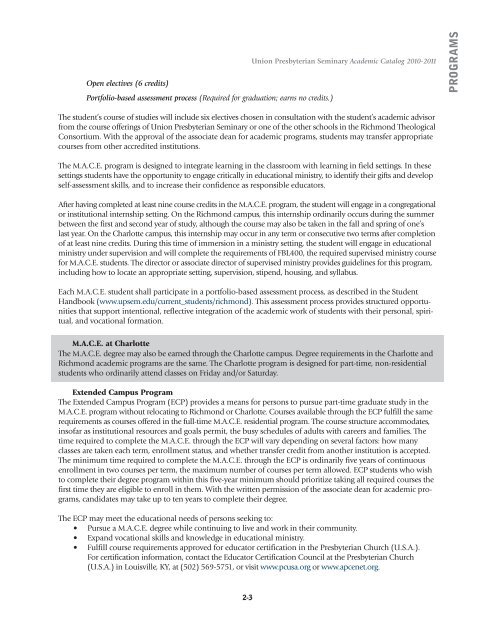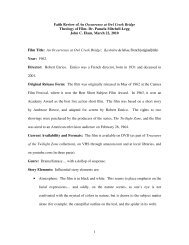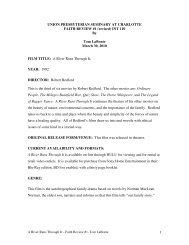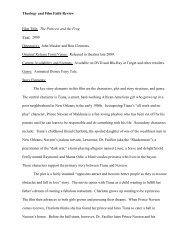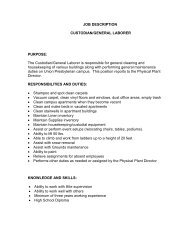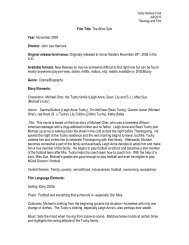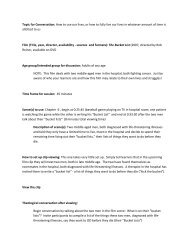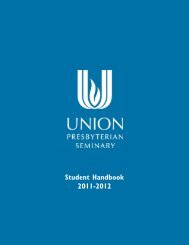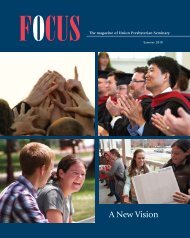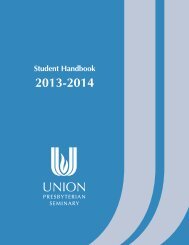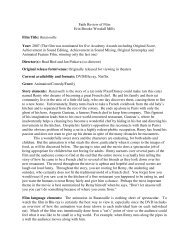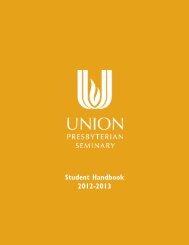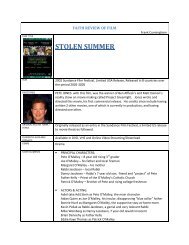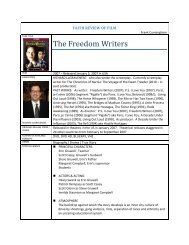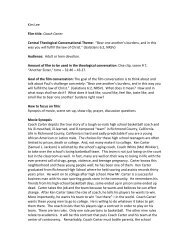Academic Catalog 2010-2011 - Union Presbyterian Seminary
Academic Catalog 2010-2011 - Union Presbyterian Seminary
Academic Catalog 2010-2011 - Union Presbyterian Seminary
Create successful ePaper yourself
Turn your PDF publications into a flip-book with our unique Google optimized e-Paper software.
Open electives (6 credits)Portfolio-based assessment process (Required for graduation; earns no credits.)<strong>Union</strong> <strong>Presbyterian</strong> <strong>Seminary</strong> <strong>Academic</strong> <strong>Catalog</strong> <strong>2010</strong>-<strong>2011</strong>PROGRAMSThe student’s course of studies will include six electives chosen in consultation with the student’s academic advisorfrom the course offerings of <strong>Union</strong> <strong>Presbyterian</strong> <strong>Seminary</strong> or one of the other schools in the Richmond TheologicalConsortium. With the approval of the associate dean for academic programs, students may transfer appropriatecourses from other accredited institutions.The M.A.C.E. program is designed to integrate learning in the classroom with learning in field settings. In thesesettings students have the opportunity to engage critically in educational ministry, to identify their gifts and developself-assessment skills, and to increase their confidence as responsible educators.After having completed at least nine course credits in the M.A.C.E. program, the student will engage in a congregationalor institutional internship setting. On the Richmond campus, this internship ordinarily occurs during the summerbetween the first and second year of study, although the course may also be taken in the fall and spring of one’slast year. On the Charlotte campus, this internship may occur in any term or consecutive two terms after completionof at least nine credits. During this time of immersion in a ministry setting, the student will engage in educationalministry under supervision and will complete the requirements of FBL400, the required supervised ministry coursefor M.A.C.E. students. The director or associate director of supervised ministry provides guidelines for this program,including how to locate an appropriate setting, supervision, stipend, housing, and syllabus.Each M.A.C.E. student shall participate in a portfolio-based assessment process, as described in the StudentHandbook (www.upsem.edu/current_students/richmond). This assessment process provides structured opportunitiesthat support intentional, reflective integration of the academic work of students with their personal, spiritual,and vocational formation.M.A.C.E. at CharlotteThe M.A.C.E. degree may also be earned through the Charlotte campus. Degree requirements in the Charlotte andRichmond academic programs are the same. The Charlotte program is designed for part-time, non-residentialstudents who ordinarily attend classes on Friday and/or Saturday.Extended Campus ProgramThe Extended Campus Program (ECP) provides a means for persons to pursue part-time graduate study in theM.A.C.E. program without relocating to Richmond or Charlotte. Courses available through the ECP fulfill the samerequirements as courses offered in the full-time M.A.C.E. residential program. The course structure accommodates,insofar as institutional resources and goals permit, the busy schedules of adults with careers and families. Thetime required to complete the M.A.C.E. through the ECP will vary depending on several factors: how manyclasses are taken each term, enrollment status, and whether transfer credit from another institution is accepted.The minimum time required to complete the M.A.C.E. through the ECP is ordinarily five years of continuousenrollment in two courses per term, the maximum number of courses per term allowed. ECP students who wishto complete their degree program within this five-year minimum should prioritize taking all required courses thefirst time they are eligible to enroll in them. With the written permission of the associate dean for academic programs,candidates may take up to ten years to complete their degree.The ECP may meet the educational needs of persons seeking to:• Pursue a M.A.C.E. degree while continuing to live and work in their community.• Expand vocational skills and knowledge in educational ministry.• Fulfill course requirements approved for educator certification in the <strong>Presbyterian</strong> Church (U.S.A.).For certification information, contact the Educator Certification Council at the <strong>Presbyterian</strong> Church(U.S.A.) in Louisville, KY, at (502) 569-5751, or visit www.pcusa.org or www.apcenet.org.2-3


